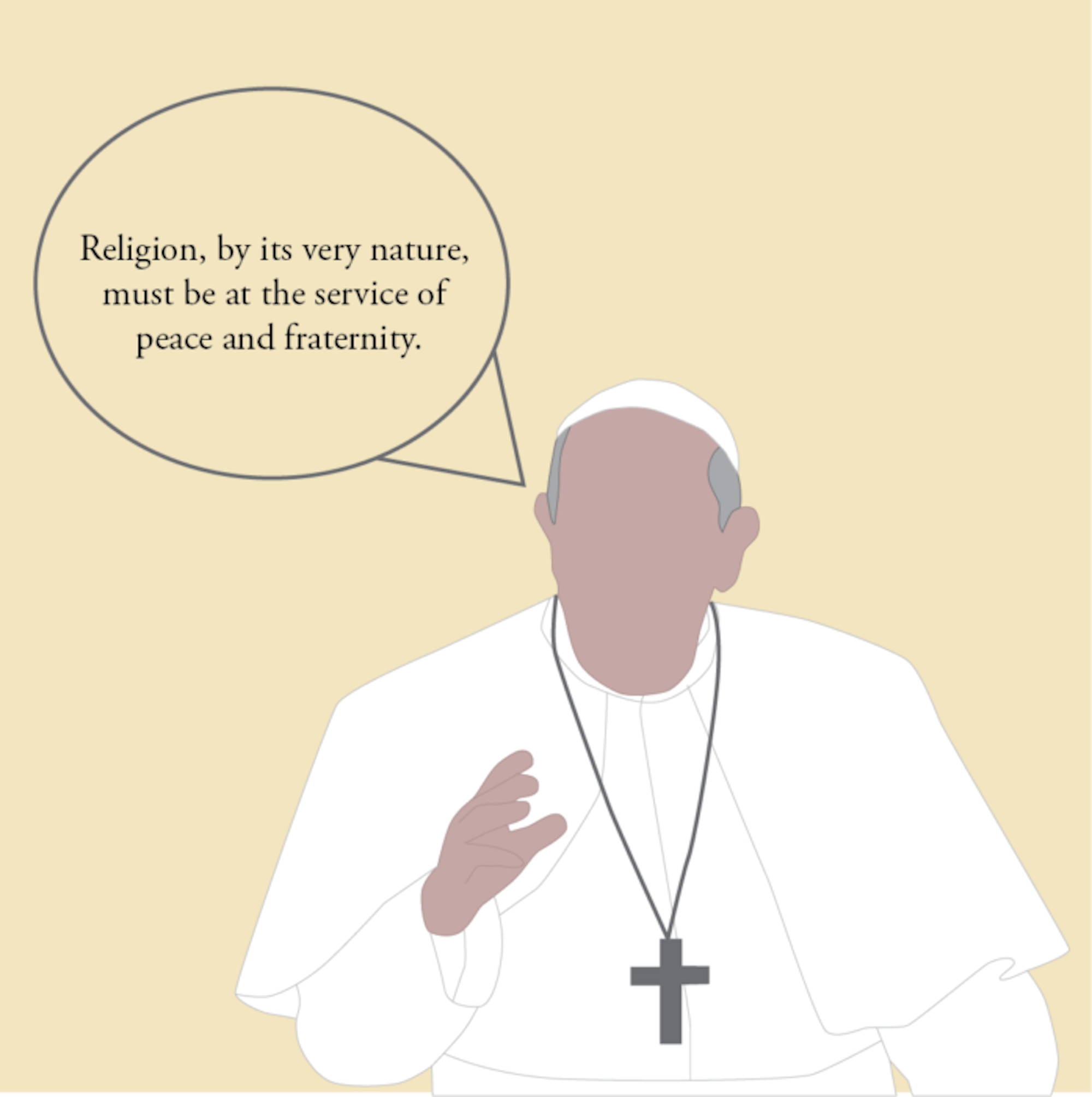
Last week, Pope Francis became the first Catholic pope to visit Iraq. Throughout his visit, he gave a series of remarks that repeatedly emphasized one theme: peaceful fraternity between different religious groups. The Pope pulled no punches and made no equivocations about the absolute need for peace in the search for justice, remarking in his first statement of the trip, “Religion, by its very nature, must be at the service of peace and fraternity.” Religiousdivision must never be a source of human conflict, Pope Francis argued, because religion initself is a communal movement towards God. This idea caused me to reflect on how peace isthreatened in our lives and what we as Notre Dame students can do to pursue peace.
First off, I do not believe that pursuing peace means being complacent with injustice,such as oppression, racism, violence or anything of the sort. All persons should call out andactively work against injustice; students at the University of Notre Dame have far more powerto do so than most people in this world. We must use the tools and privileges that have beenprovided to us to fight for good in this world, which means speaking truth to power, takingmaterial action towards justice and dedicating our lives to the benefit of those most in need.This action might be seen as ‘divisive,’ but the kind of unity that passively accepts wrongdoing isnot the kind of unity that any of us should be striving towards. Instead, we must seek toembrace our fellow humans, recognizing both their faults and our own and striving together todo better.
Loving our neighbor entails hoping for, and striving towards, the genuine well-being ofall human persons. But one of the most common aspects of the human experience, in my view,is to make exceptions to these wishes of well-being for all people. Almost everyone, certainlyincluding myself and everyone I’ve ever met, struggles to make this hope for well-being quite universal, if they try at all. If you’re doubting that this is really so hard, consider the following: Have you everrejoiced at the death of someone you really hated? Have you ever wished death uponsomeone, perhaps a personal tormentor or a hated celebrity? (I cannot count the number oftimes I have heard people of every political inclination wish death upon politicians). Do youbelieve that there are people in this world who are simply evil and incapable of rehabilitation?Do you go so far as to believe that entire groups of people fall into this category? On a muchsmaller scale: do you smile, perhaps only to yourself, when an ex goes through a breakup? Doyou relish the thought of a member of a rival sports team getting injured?
If any of your answers were yes, and I’m willing to bet they were, then you are flawed.Actually, you’re flawed either way, but hopefully, you’ve realized that you probably suffer fromthis particular flaw: the lack of love for all of our siblings. There cannot be exceptions to ourlove for our neighbors. If there are, how dare we fault our neighbors for their lack of love forus? If we say, “I believe in universal human rights/dignity/love, but…” then we are the problemto at least the same extent as those we hate. The exceptions we make to universal love aredirect attacks on universal peace. In order to achieve peace, we must love others, even — especially — when it is difficult.
So what does that look like in practice? At the most immediate level, I think it meanspracticing forgiveness and opening our vulnerable hearts. Reach out to that guy you’ve beenfeuding with on Twitter; grab lunch with that AR you can’t stand. We must forge relationshipseven with those people we strongly disagree with, even with those people who might hurt us,even with those people we believe are personally abominable. Let your friends be friends withthe person who dumped you, have a (soft) drink with your annoying roommate from freshman year. We cannot allow grudges, past wrongs or perceived slights to poison our ability to growtogether.
In a wider sense, we must work for the benefit of those in need, regardless of whatfaults we find in them and without concern for their physical or personal distance from us. Wecan’t write off our obligations to help others because we blame them, their actions or theirpolitical leaders for their problems. Don’t simply smirk at the recent devastation in Texasbecause you don’t like Governor Abbot or Republicans overall; contribute to helping those inpersonal or financial turmoil. Don’t dismiss the needs or rights of the incarcerated because oftheir histories; fight for their safe treatment, rehabilitation and reintegration into society.
Many of us will leave Notre Dame and reach great positions of power where we mightactually be able to directly affect the status of peace in Iraq. Many of us will not. But all of uscan fight the cycle of violence by deciding to love our neighbors as ourselves, that is, as deeplyflawed humans who nevertheless should be granted mercy and forgiveness.
The need for justice and the need for peace are inseparable. This means not only thatwe must fight wrongdoing while loving wrongdoers; it means that the two obligations are reallyone and the same. Justice is doing right towards others; social justice is the creation of acommunity in which we treat each other well. This requires peace between all, and peace, in turn, requires the hatred of hatred itself. Pope Francis said that “...anyone who believes in God,has no enemies to fight. He or she has only one enemy to face, an enemy that stands at thedoor of the heart and knocks to enter. That enemy is hatred.” May we never use religion as aweapon, and may we all work for peace on earth.
Vince Mallett is a senior majoring in philosophy, with a minor in constitutional studies. He currently lives off-campus, though he calls both New Jersey and Carroll Hall home. He can be reached at vmallett@nd.edu or @vince_mallett on Twitter.













